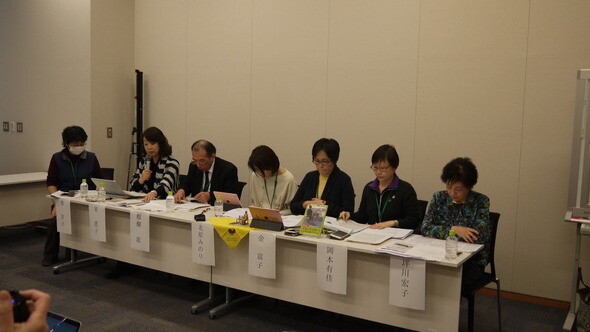hankyoreh
Links to other country sites 다른 나라 사이트 링크
Japanese media’s “one-sided” reporting on comfort women issue

“I was shocked by how one-sided the report was. It was faithful to the position of the Abe administration that the comfort woman issue was resolved [by the Dec. 28, 2015 agreement between South Korea and Japan]. It was if the report had been orchestrated by the government,” said Yoko Shiba, co-president of the National Movement for Resolving the Issue of the Japanese Military Comfort Women, on Feb. 2.
Shiba, during the press conference at the meeting room of the second lawmakers’ hall at Japan’s House of Representatives in Tokyo, she criticized the Jan. 24 edition of Close-up Gendai Plus, a current affairs program broadcast on NHK.
The National Movement and the Violence Against Women in War Research Action Center have been fighting an uphill battle against Japanese public opinion in their efforts to resolve the comfort women issue, and they held a press conference on Feb. 2 to protest one-sided reporting on the comfort women by the Japanese media, including NHK.
Mentioning the fact that “34 of the 46 comfort women” who were alive at the time of the Dec. 28 agreement “accepted the financial assistance,” the NHK program in question reported that “because their voices are not being adequately heard in South Korea, there are increasing calls for the agreement to be revoked.” Interestingly, the program introduced Jeong Kyu-jae, editor-in-chief of the Korea Economic Daily and a far-right conservative, as one of the leading South Korean journalists who are “calling for a coolheaded approach as [South Korean] public opinion overheats.”
In an open letter sent to the broadcaster on Jan. 31, the National Movement emphasized that “there are diverse views among the people in question” and asked “why the program did not introduce the voices of the victims who refused to accept the financial support to protest the agreement and why the program definitively concluded that the setting up of South Korea’s comfort woman statue took a form that was different from what the people in question expected.”
The program ultimately claims that “the responsibility [for the campaign against the Dec. 28 agreement] lies with South Korea’s civic groups, but the facts are wrong here. If they really want to resolve this problem, reporters need to look into why South Koreans are so angry and why some of the victims refused [the large sum of 100 million won],” said Yang Jing-ja, co-president of the National Movement.
“Running stories in Japanese society about how ‘strange’ South Korean society is will only increase the divide between the two societies. In that sense, the Japanese press is making a critical mistake,” Yang added.
By Gil Yun-hyung, Tokyo correspondent
Please direct questions or comments to [english@hani.co.kr]

Editorial・opinion
![[Editorial] It’s time for us all to rethink our approach to North Korea [Editorial] It’s time for us all to rethink our approach to North Korea](https://flexible.img.hani.co.kr/flexible/normal/500/300/imgdb/original/2024/0621/7517189559819182.jpg) [Editorial] It’s time for us all to rethink our approach to North Korea
[Editorial] It’s time for us all to rethink our approach to North Korea![[Column] Why empty gestures matter more than ever [Column] Why empty gestures matter more than ever](https://flexible.img.hani.co.kr/flexible/normal/500/300/imgdb/original/2024/0619/7217187833478369.jpg) [Column] Why empty gestures matter more than ever
[Column] Why empty gestures matter more than ever- [Editorial] Seoul’s part in N. Korea, Russia upgrading ties to a ‘strategic partnership’
- [Column] The tragedy of Korea’s perpetually self-sabotaging diplomacy with Japan
- [Column] Moon Jae-in’s defense doublethink
- [Column] S. Korea-China cooperation still has a long way to go
- [Editorial] Seoul must use tact and diplomacy to check deepening Russia-NK ties
- [Editorial] Thorough audit, evaluation of oil test drilling are needed
- [Editorial] Yoon prioritizes his administration over South Korea’s safety once again
- [Column] The monumental shift in N. Korea’s nuclear program that never happened
Most viewed articles
- 1[Editorial] It’s time for us all to rethink our approach to North Korea
- 2North Korea’s real motive for publishing the full text of new treaty with Russia
- 3[News analysis] N. Korea’s new pact with Russia is ‘mirror image’ of Yoon’s alliance with US
- 4Seoul hints at lethal weapons aid to Ukraine to put pressure on Russia
- 5Seoul decries N. Korea-Russia mutual defense pact as ‘absurd’
- 6Hot weather hat trick to send the mercury soaring in Korea
- 7[Editorial] Seoul’s part in N. Korea, Russia upgrading ties to a ‘strategic partnership’
- 8[Editorial] Fortified N. Korea-Russia ties should be a wakeup call for Seoul
- 9Putin, Kim pledge ‘mutual assistance’ in event of outside aggression
- 10[Photo] K-pop: For everyone, everywhere